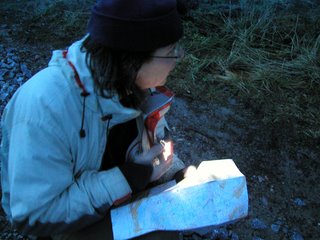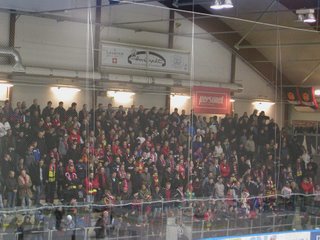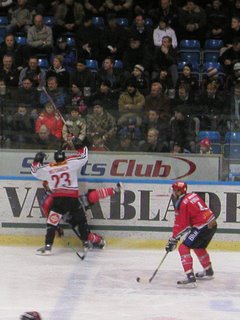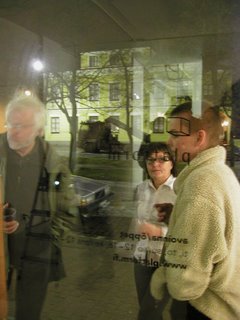Friday, December 29, 2006
Saturday, December 23, 2006
Friday, December 22, 2006
Friday, December 15, 2006
Sunday, December 10, 2006
FEAR + DESIRE
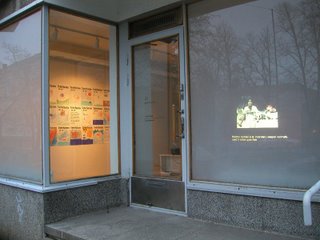
platform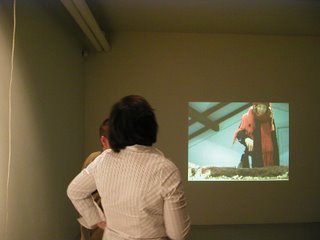
video da performance//acc'ao// welcome - de dia 3 de dezembro - em que demos as boas vindas a um cadaver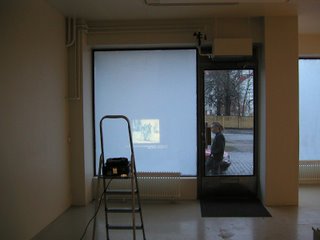
diaporama= Uprising, relaciona a winter war finlandesa com a intifada na palestina
Storm = pequeno video acerca do desemprego na europa -
wormwood, ou Absinto = relaciona a cratera do meteorito feita a milenios atras em söderfjärden, aqui em solf, com o apocalipse de S'ao Jo'ao e o medo das grandes catastrofes, como a gripe das aves, terrorismo, mudancas climatericas, que de alguma forma a juda a camuflar o medo das pequenas coisas. desenhos feitos pelas crin'cas da escola de solf.
Postado por
carla
em
6:51 AM
4
comentários
![]()
Marcadores: FEAR+DESIRE, Finland, Platform, VAASA
Friday, December 08, 2006
de venus a marte
homens e mulheres pensam e agem de forma diferente?!
porque 'e que o sindrome "glass ceiling" ocorre? - glass ceiling - ou aquilo que impede as mulheres de atingirem lugares de topo nas suas carreiras. o que 'e que as mulheres e os homens querem? na procura de descobrir se h'a formas diferentes de fazer arte, design, arquitectura, politica, economia, etc. Por homens e mulheres.... ou apenas alguns artigos de interesse
de venus amar -te devenusamarte de venus a marte
Postado por
carla
em
8:21 AM
4
comentários
![]()
Thursday, December 07, 2006
FEAR + DESIRE

Carla Cruz, works and lives in Porto (Portugal). She is the guest-artist during october-december at KulturÖsterbotten´s Artist in Residence programme Ateljé Stundars.
# Platform #
Every year thousands of people leave their home towns, their countries, in search of a better life, a bearable life. These people normally travel from countryside to bigger towns, from pourer countries to richer countries, from countries at war or with totalitarian regimes to democratic and peaceful countries. These people – emigrants – are the motor of several high income developed countries that wouldn’t be able to maintain the level of production and quality of life without them.
After having been primarily countries of emigration for more than two centuries, many countries within European Union gradually became destinations for international migrants.
One of the factors connected to migration is undoubted economical.
Most of the first 15 members of the European Union have already faced the displacement of their major industries to countries with a cheaper labour force. The same will happen, sooner or later, to all the new members. As the quality of life rises and salaries become higher, international or even national companies flight wherever they can produce the same thing for less money.
Finally in this millennium Europe is a continent at peace, at least within its boarders. But that hasn’t been so for the last centuries. Europe history is also a narrative about self determination.
This apparent peace is kept, together with a constant state of fear und urgency. But what are we most afraid of? Loosing someone dear to us or ones life, for sure comes first, but apart from that, what are Europeans afraid of?
We are afraid of the unknown, uncertain and insecure. We are afraid of those who frighten us. Those who want the same as we do. Those who desire security and peace. We are afraid of those who invade our boarders to live our way, but not quite the same way, afraid of those who in their own boarders want to live in their way, not our way, but being subjected to our ways anyway.
Still what we acknowledge as being frightening are the big cataclysms: Third World War; environmental collapse; pandemic diseases and extra Terrestrial Apocalypse in the shape of meteorite collision.
Thus we come to Wormwood - as on the one hand is the silhouette of our fears and on the other the veil that covers our real anxieties. (For if we are not political anymore we are truly politically correct. Therefore would never openly mention that our biggest fear is actually our non EU neighbours.)
500 million years ago a meteorite crashed into the earth not far from where we stand, being immediately galvanized by the explosion and leaving a scar 6 km of diameter. this could had been the description of the impact: I saw a star from heaven fallen unto the earth as it were a great mountain burning with fire as a torch - it was cast into sea: and the third part of the sea became blood; and there died the third part of the creatures which were in the sea; and the third part of the ships was destroyed. as well as a third part of the rivers, and the third part of the sun was smitten, and the third part of the moon, and the third part of the stars; that the third part of them should be darkened, and the day should not shine for the third part of it, and the night in like manner and the name of the star is called Wormwood: and the third part of the waters became wormwood; and many men died of the waters, because they were made bitter. But on those times life wasn’t yet been blown on earth. Plus the apocalypse is still to come.
So let us sing: Ja, må du leva, Ja, må du leva, Ja, må du leva uti hundrade år.
(que 'e como quem diz: sim, que vivas; sim, que vivas; sim, que vivas at'e aos cem anos) - ai esta a ironia final
Postado por
carla
em
5:42 AM
1 comentários
![]()
Marcadores: FEAR+DESIRE, Finland, VAASA
Monday, December 04, 2006
apetizer from my WELCOME event
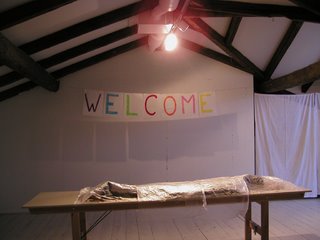
Welcome
Every year thousands of people leave their home towns, their countries, in search of a better life, a bearable life. These people normally travel from countryside to bigger towns, from pourer countries to richer countries, from countries at war or with totalitarian regimes to democratic and peaceful countries. These people – emigrants – are the motor of several high income developed countries that wouldn’t be able to maintain the level of production and quality of life without them.
History is made of this migrations and search for ways of supporting oneself and families. With them, migrants bring knowledge, other perspectives on the world, technology, culture, and carry back other knowledge, different ways of thinking and doing, wealth, affecting in this manner the development on their home countries. For some countries a huge part of their income is brought by emigrants. For the hosting countries, several, with a considerable rate of aging population, these immigrants brought youth and production strength. For one should not forget the industry it can be for one to set oneself in motion to migrate. In addition international immigrants are in general male between 20 and 40 years old and highly motivated.
Many countries within European Union were for more than two centuries primarily emigration countries and gradually in the last 50 years became destinations for international migrants.
“Having lost more than 1 million people as emigrants during previous hundred years, in the 90’s Finland became a country of immigration” still the biggest group of immigrants are persons who reside in Finland through marriage and a considerable portion of the foreigners are returned Finnish emigrants or their children, who have the citizenship of another country.
Likewise Portugal, who has about 4.3 million people living abroad, recently became the interest of migrants.
“The principles of democracy, respect for human and civil rights taken together with freedom of movement would seem,” in the view of John Parry, as he speaks about the European Union, “to demand a common citizenship which is inclusive, not exclusive and based on equality. It would not challenge national citizenship but broader in scope. Above all, it would respect different cultures, languages and costumes of its diverse population.” But this is only within our boarders for the “right to leave any country, including his own”, which part of the Universal Declaration of Human Rights has no similar position regarding entry of non citizens.
Therefore this visionary Union faces (or cover) daily the tragic fate of those who cross the Mediterranean Sea and other borders, illegally, on the quest of a better life.
Today we will ironically welcome one of those immigrants, which sometimes the European Union seems to congratulate their failure, singing:
Ja, må du leva, Ja, må leva, Ja, må du (han,hon, dom) leva uti hundrade år.
Postado por
carla
em
12:36 AM
7
comentários
![]()
Marcadores: Finland, Participation, welcome




